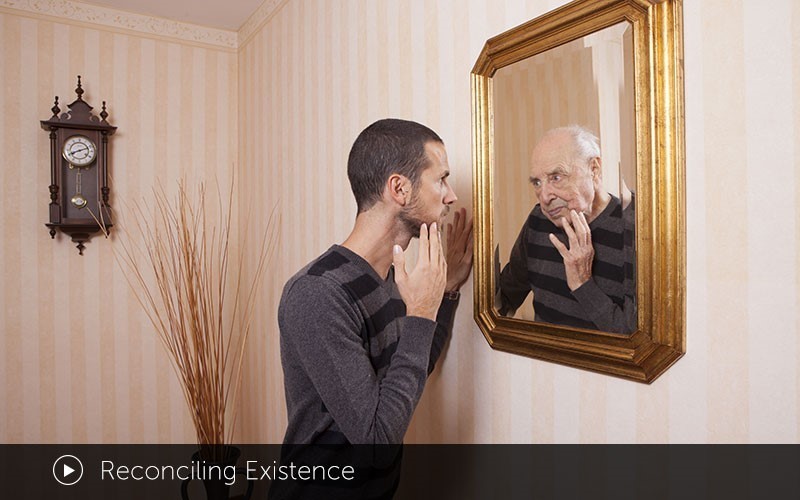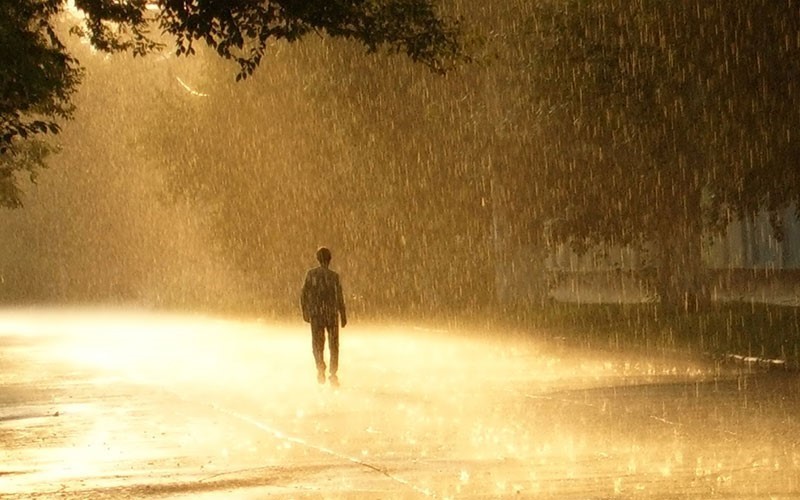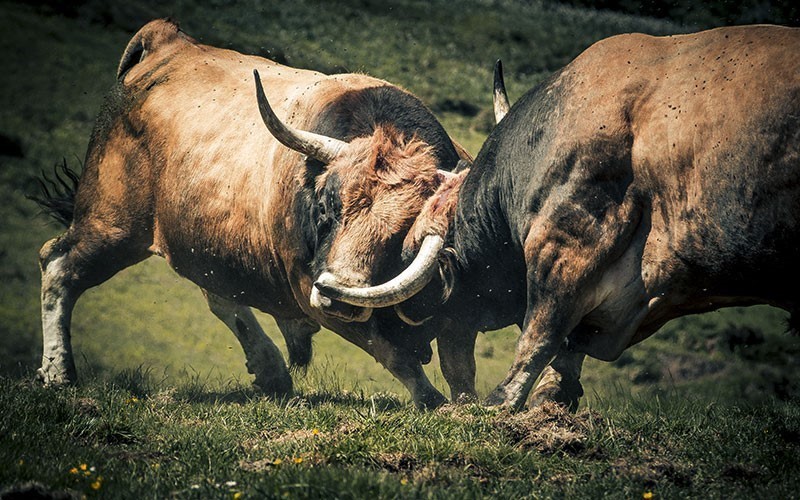Topics
 00:01:12
The Journey Home
Video
Duration : 00:01:12
"I have done something in my life I can’t forgive myself for.” - South African P...
00:01:12
The Journey Home
Video
Duration : 00:01:12
"I have done something in my life I can’t forgive myself for.” - South African P...
Individual: [reading question]
“I have done something in my life that I cannot forgive myself for. I killed two of my children and nearly killed myself because of the abuse I was suffering. I want to feel the peace that you are talking about, but I think I have lost the capability to feel it. Is there any chance for me?”
Prem Rawat:
Well, do you think there is any chance for this person?
Audience:
Yes!
Prem Rawat:
There is the answer. Sometimes you may have walked too far away from your home. And when she did what she did, she walked a little bit too far away from her home. But her home is still there. And it may be a long journey, and it may take a little while, but the home is still there.
– Prem Rawat
 00:06:49
Reconciling Existence
Video
Duration : 00:06:49
They will always live in you, always! In your memories they will be, they will l...
00:06:49
Reconciling Existence
Video
Duration : 00:06:49
They will always live in you, always! In your memories they will be, they will l...
MC: [June Sarpong]
So, the next question is quite a poignant one—and again, this is from an audience member. And then she says, “My mum just died. Someone I loved so deeply is no longer here. I feel the pain of parting. Can you help me come to terms with this?”
Prem Rawat:
Yes, I think I can help. When she was alive.... And first of all, you know, my heartfelt condolences, because it is very difficult to lose somebody that you love. And there is a process of sorrow—and of course, you should go through it—because that’s when, in this sorrow, you reconcile your existence.
But understand something—that when she was alive—and sometimes she would get up and go somewhere else! Right? And when she would do that, you knew she wasn’t here, but she was somewhere else! Right?
Well, not that much has changed. One, she will always live in you—always! In your memories, she will be. She will laugh; she will dance; she’ll call you affectionately. This you can embrace. This you can embrace.
And make peace with yourself; make peace, because this is the law of nature. And nobody can change it. Knowing yourself—knowing yourself is also understanding her—because she lives in you.
And it is not the final story by any stretch of the imagination. We are a part—she was once a part—you weren’t born then—but she was a part of this earth. She had no shape of her own; she had the shape of the earth.
And you, do you know, right, that you’re seventy percent water? That’s mostly all of you—I mean, that’s thirty percent left for everything else—that includes guts and bones and nails and hair and eyeballs and—I mean, you’re seventy percent water!
And that’s what she was; she was this earth, indistinguishable—the dust, the water that flows in this, on this earth. And from there, from this, temporarily emerged this being—gave birth to you.... And now she has gone back to being exactly who she was, part of this earth.
When you celebrate your existence, you celebrate her existence. When you celebrate your joy, you celebrate her joy.
Do not underestimate how concerned a tree is for its seed. The strategies that trees have adopted to make sure that that seed exists and goes on; it is unbelievable, unbelievable. The only difference between us and trees—well, you know what the difference, really, the only difference—and this is coming from an expert, not from me, an expert—is we move; they don’t.
And the strategies that they have adopted so that they can live on—and this is you! You see, you, you, you, you—your mother was the tree; made you—and you live. And so far you do....
And when you thrive, she thrives—because she’s inseparable. And when you are happy, she’s happy—because that tree made you. And when you express kindness and when you express appreciation and when you express joy, she expresses joy. Don’t you see how connected you are?
So, now you are in sorrow because you see the separation—right? And the day you start seeing reality, you will see the connection. And when you do, the world will change—for you. Make the connection. Make the connection.
 00:05:50
Raining Gold
Video
Duration : 00:05:50
An excerpt from Amaroo Series 2018, Episode 4
00:05:50
Raining Gold
Video
Duration : 00:05:50
An excerpt from Amaroo Series 2018, Episode 4
There is a saying in Hindi. One day it started to rain gold—and it was raining gold everywhere. There was a washerman. He said to himself, "My goodness, it’s raining gold outside. And this is my house! And this is my house. And whatever gold is raining by my house is mine! So nobody’s going to come and get it."
"But where I wash my clothes, that’s on the banks of the river—and that’s not really my place, but it’s raining gold. So, I’d better go there and get the gold first." So, by the time he got to the bank of the river, the gold had been picked clean. There was nothing left for him. And he went, "Naah, not, not to worry. Nobody would have taken the gold at my house."
So, he went back. By the time he got to his house, all the gold had been picked clean. So it rained gold, and he didn’t get any, neither at home nor at his workplace. So, the saying in Hindi goes, "Na ghar ka, na ghat ka." And, “ghat” is by the bank of the river; "ghar" is “home.”
Would you like your condition to be like that? "Na ghar ka, na ghat ka." Came here; had the opportunity to enjoy, to have that bliss, to have that beauty in your life. But you said, "Oh, well, let me work hard"—like an idiot, like a donkey, day and night.
At night, what did you think of? Your job. In the morning, what did you think of? Your job. In the evening, what did you think of? Your job. And at night, what did you think of? Your job. And then when you got sick and tired, you started thinking about retirement.
And then you got to retirement. And then you started looking at your whole life that had passed by. And then you start to smell, "sniff-sniff, sniff-sniff, sniff-sniff, what is that peculiar smell? Ah, that’s the crusty old wall." You smell it.
Knowledge offers that opportunity to enjoy that heaven now, while you’re alive, every single day. And you don’t have time for that? You’re in the wrong body, son! You’re in the wrong place! You should have been on Mars. In one of those other planets, some frozen amoeba, seven thousand feet under the surface, waiting for an opportunity.
Because this is very different. Here, the blessing comes, blesses you; leaves, comes again. Leaves, comes again. Leaves, comes again. Leaves, comes again. Leaves, comes again. And each time that it comes, it is new and it is fresh and it is real.
And that’s how elegant it is—elegant! Knowledge is elegant. Not a set of rules—elegant! You accepting it, you understanding it, you opening it, you taking advantage of it, you enjoying it. You.
- Prem Rawat
 00:16:50
Dream Within a Dream
Video
Duration : 00:16:50
Whenever this wisdom was passed to people, it would be in sync with the time, wo...
00:16:50
Dream Within a Dream
Video
Duration : 00:16:50
Whenever this wisdom was passed to people, it would be in sync with the time, wo...
One of my favorite stories that I have heard since I was a little kid—my father used to tell it—was, there was this king. And one day, this king was attacked, except this attack happened when he was sleeping.
So he’s lying in his bed, and he’s dreaming that he has been attacked, and that he has lost his kingdom; he lost the fight. And the winning king has given orders that he be executed—and he’s running through the forest to save his life.
He finally finds himself in the forest, and he’s hungry. He’s cold; he’s hungry. He finds a hut. In the hut there is an old lady. He knocks on the door, and he says to the old lady, “Can I have something to eat?” She goes, “I just finished making my food, and I have eaten it. But I do have a little bit of lentils left, and a little bit of rice, uncooked. Here it is. Cook for yourself, and eat and be satisfied.”
The king goes out, finds the wood—it has been raining and the wood is all wet. He starts a fire, and the fire is getting into his eyes. And it’s very difficult to start the fire, but he somehow manages to start the fire; he puts the pot on the fire. He puts the dahl, the lentils, the rice, a little bit of salt—cooks himself what is called a kitchari. If you’re from Scotland, a kedgeree—but it’s the same thing.
It’s too hot for him to eat, so he puts it on a leaf to cool down. Two bulls come by, fighting, and he has to move away. And they take what he has made, and stamp, stamp all over it, and mix it in the mud.
The pain of this defeat, losing the war, losing his kingdom, hunger, being in the forest—just imagine, that’s a nightmare! He’s having a nightmare, right? That’s the problem with nightmares; when you’re having them, you don’t know you’re having a nightmare. It seems so real.
And he starts crying. And when he starts crying, he’s crying for real. Not just in his dream; he’s actually crying, and that wakes him up. And he opens his eyes, and in the dim light of his room, lit by little lamps, he sees the magnificent bed, embroidered curtains. Gold is flickering from the little light of the lamps at night.
He can see the outline of his soldiers, standing their guard with spears, as their uniform is glistening from the little light from the lamps. He feels around him, and he’s lying on the softest possible bed he can imagine, with velvet pillows.
At that moment, a question strikes him. And the brilliance of this story is just this question that strikes him—which doesn’t strike us. That whoever wrote this story, whoever came up with this story....
See, well, you hear many, many stories—at least from me. And each one of the stories has a pivotal point, this one point that the author, the teller is trying to convey to you, that is the message of the story, that is the reality of the story. Now, it may not happen with Dirty Harry—that’s Clint Eastwood’s movie—it may not have that pivoting point of “something to tell.”
But these deep stories, which were truly a way to convey wisdom to people, to the masses who would hear it.... And people would go from cities to city, to village to village, and tell these stories, and this was people’s entertainment—how sweet that time must have been.
Before Ved Vyas—the person who wrote Mahabharat—the rishis and the many, many ashrams that existed, and many teachers that existed, had the knowledge, had the knowledge of what was eventually put in the vedas. But they refused to write it.
Writing existed, and means for writing existed. But they refused to write it. Do you know why? Because they knew that if it was ever written, it no longer would be synced with time.
That whenever this wisdom was passed to people, it would be in sync with the time. What would come out would be understood by the people of that time, would be current for those people of the time, would be accepted by those people of the time. It…they would be used by the people of the time.
The downside of it was, that as rivers shifted—because India was still moving north, and this is a reality of it; India is still moving around, and then the rivers are going, “Not here. Not any more.” And people have set up their ashram....
Because, one of the most—see, the…one of the most important things was water. And in those days, cities or villages or whatever was done, it was, “Make sure the water is available.” Because if you had the water, you could grow crops. And, of course, without water, no life.
Not like today, where there are these cities and there is no water. There is a—I saw a documentary of a city in California; there’s no water. And every ounce of water, for the toilet, for the sink, for brushing the teeth, is shipped in by trucks. And you don’t want to go there—because they conserve their water; they don’t take showers.
Anyhow, that something remains current. And here is the pivotal point of that story.
So, he wakes up. He looks around; he sees he’s still a king. Soldiers.... I already described everything pretty well, right? The question he asks himself: “Is this a dream? Or was that a dream,” where he’s hungry? He has questioned both! What would you do?
Oh, you know, instruments of truth, who can detect truth just like that—“Is there something black on my nose?” “No.”
You see, you know, have you seen mechanics? Car mechanics? Sometimes they will have a big line right here, and they don’t know. They’re going around like, “No, there’s nothing there.” To them, that’s the truth. The truth to you would then be, “Oh, no, no, look, look at your face.”
That’s not the truth either; that’s not the truth either, and he’s asking himself a question, “Which one was the dream?” Would we have the gall to ask that question, “Which one is a dream? Was our nightmare real—and what we are seeing now is real? And which one is a dream? Which one is the nightmare and which one is the reality?”
So, anyway, the story goes on; he makes a declaration, “Please, somebody answer my question.” People come out; he’s getting BS answers like he would today—stupid answers.
“You know, according to your astrology sign, that was just a nightmare, king. This is what’s real. Your destined to be the king; there’s nobody born who can defeat you, bla-bla-bla-bla-bla.” And he’s not buying it; he’s not convinced. He’s been touched by that dream so hard, he really wants to know which one is real.
That, there’s nothing to stop for him dreaming. That he has made a declaration—that he woke up and found that he’s still a king, when he’s maybe lying on some floor in the jungle, hungry and wet.
And finally, as—and so he keeps upping the ante, you know? It’s like, “Okay, whoever answers it can have this, can have this, can have this,” and it just kept escalating, escalating, escalating, and he finally gets down to it, and he goes, “Okay, I’ll give half of my kingdom to whoever answers my question.”
Everybody tried; everybody failed. Finally this person, Ashtabakr—and he was deformed! So, he comes; he sits down. And everybody starts laughing.
And the first thing Ashtabakr says is, “How come you have called me, how come you have invited me, O King, to the company of leather-workers?” In India, that’s an insult, by the way. That’s a low-down task, to work with the leather. “Chamar.”
Everybody hears the word “chamar” in his gathering, and they are like, “How dare you call these learned people ‘chamar’?” He goes, “They look at my skin—they look at my skin, and they’re laughing. They don’t know what I have in here, and they don’t know my knowledge. So obviously, they deal in skin.”
The king goes, “Okay, this, this sounds promising.” And here comes the answer—the second twist, the untangling—so, the tangling is, “Which one is real?” And the untangling, here it comes.
The untangling is, “O King, both are dreams.” Right? “Both are dreams. What you dreamt being in the jungle, being hungry was definitely a dream. But what you see with your eyes open, my king, is also a dream.” Tellers of truth, figure that one out. Both are—both are just a dream?
It is the easiest thing to forget: “This is a dream.” Because you were so deep into this dream, that it doesn’t seem like a dream. And there’s only one solution to this problem—only one. Only one—to be reminded again and again and again and again and again, “It’s only a bloody dream; it’s only a bloody dream; it’s only a bloody dream.”
And of course, that’s what sets forth the value for the Master. “It’s only a dream; it’s only a dream; it’s only a dream; it’s only”—and you’re like, “And no, it doesn’t look like a dream. It doesn’t look like a dream.” But isn’t it? “It is a dream; it is a dream; it is a dream; it is a dream; it is a dream.”
“Doesn’t seem like a dream; it doesn’t seem like a dream,” “Yeah, but it is a dream; it is a dream; it is a dream; it is a dream.”
Just like he said, Ashtabakr said, “That was a dream, and this is a dream. Don’t seek reality here. If you want to seek reality, seek reality in you, in that real place that you have which is not a dream.”
- Prem Rawat
 00:07:55
Added Value
Video
Duration : 00:07:55
How much is something worth? As much as what’s within it.
00:07:55
Added Value
Video
Duration : 00:07:55
How much is something worth? As much as what’s within it.
If you have a little box, when you go to the jeweler and you buy a ring—right? It comes in a little box. If you have been to a jeweler, you will see that he has many boxes like that—many. Drawers and drawers full of boxes like that. And they’re all empty. And then when you buy your ring, he puts that ring in that box. Right? He closes it and gives it to you.
Before there was a ring in the box, the value of the box was menial—menial! In fact, if you carried that box in your pocket, empty, and somebody robbed you, stole the box, you would laugh! “Ha-ha-ha!” Right? Because you know it’s worthless! Right? But, as soon as the ring is placed in the box, the value of the box becomes the same as the ring.
Now you don’t want to lose the box—“Oh, ooh, yes, yeah! Safe!” This is the box. What is the value of this box? Nothing, nothing! Nothing. You know that, right? Because, without this miracle happening of life, what is your value? Nothing. Nothing! Burn it, bury it, throw it in the ocean—who cares? Nobody cares.
They put you in a box; they put you in a box, put the box in the ground, cover you up, and then walk away! For a party! And go home; some appetizers, some drinks.... And nobody comes and asks you, “You want something? We’re having your funeral. Are you hungry?” No....
That breath keeps coming in you: you are alive; keeps coming in you: you are alive. And one day that breath goes away, and you’re gone.
And what is this thing called life? What is this thing that keeps you alive? Have you ever thought of it? The same thing that has created the universe and universes. You cannot even begin to fathom what that Divine is—but that Divine is what keeps everything going including you.
So, how much is this worth? As much as what’s within it. What is within it? The infinite is within it. This is the drop that has what in it? The ocean. The laws of physics are broken. Something big can hold something small; something small cannot hold something bigger than it. But here it does. In the confines of this is the ocean of hope, because of that beauty that resides in your heart!
So, people say, “What is a heart? Where is it!? Where is it?” So, the place where courage in you resides is called the heart. The courage. The place where clarity in you resides is called the heart. The place where hope in you resides is called the heart, and the place where the Divine in you resides is called the heart. That’s your heart.
- Prem Rawat
 00:06:19
The Train of Time
Video
Duration : 00:06:19
Knowledge of the self is the most beautiful knowledge there is.
00:06:19
The Train of Time
Video
Duration : 00:06:19
Knowledge of the self is the most beautiful knowledge there is.
There are two walls. You came through one wall when you were born. Then you were going. You're going, going, going, going... You are, by the way, you're on the train of time. There is a train of time. You're on it. And it runs exactly at the same speed. It doesn't go any slower; it doesn't go any faster. It keeps running, it keeps running, it keeps running, and then it hits this other wall and then you disappear.
This is the fate of every single human being. One day you will be gone whether you like it or not. So whatever is happening is happening between these two walls.
Now a lot of people are sitting there going, "What's on the other side of the wall? What is on the other side of the wall?" There are 7.5 billion people approximately on the face of this earth and they don't know. There's been a few billion before you and they couldn't figure it out.
Aren't you fascinated? "What happens when you go on the other side of that wall?" You should be fascinated by what is on this side of the wall. Not that side of the wall! You're making a grave mistake if you're fascinated about what's on the other side of the wall but not this side of the wall. Because you are on this side of the wall. And this should be fascinating. "Wow! Life!" Life is about presence; death is about absence. You're fascinated by absence; you're not fascinated by presence.
When you were born, what did they look for? That you're a boy or a girl? Did somebody open your hand..."What is his future, what is his future?" No. The first thing they look for - breathing or not breathing. I have been there for the birth of my children. And at that moment when that baby comes out, it's not about a boy, a girl. It's about breathing, not breathing. And everybody in the room literally, literally is like “Huh!”
Waiting for that first "waaah" and as soon as that happens, that "waaah" and the breath begins. You have no idea when the first breath is taken. Oh, the miracle! My goodness, what a miracle it is. When that first breath is taken, this is the first time the body of the mother is told, "This baby is here. This baby is alive." And you know what happens? Slowly, the blood from the placenta that is flowing through the umbilical cord starts to wane away. Because up till this point the baby is only being sustained by the mother and no other means. And if it doesn't breathe on its own, it won't happen. But as soon as the baby starts breathing, the baby's color starts changing from blue to pink. What a miracle! What a miracle! Blue to pink. And then slowly the umbilical cord starts to stop sending; the placenta stops sending the blood to the baby. And a hormone is triggered inside the mother to start releasing the placenta from the womb. The baby is on its own.
"Why is he talking about breath?" Well, shouldn't I? It comes into me and it brings me the gift of life, and because I am alive, I can see you. Presence, absence. My choice. I need to make a choice. Who are you? Presence or absence? Are you your beliefs? Because if you do not know yourself, you're just beliefs. Absence, not presence.
When there's a possibility to know, you don't stay in beliefs. You come to knowledge. Knowledge of the self is the most beautiful knowledge there is.
- Prem Rawat





